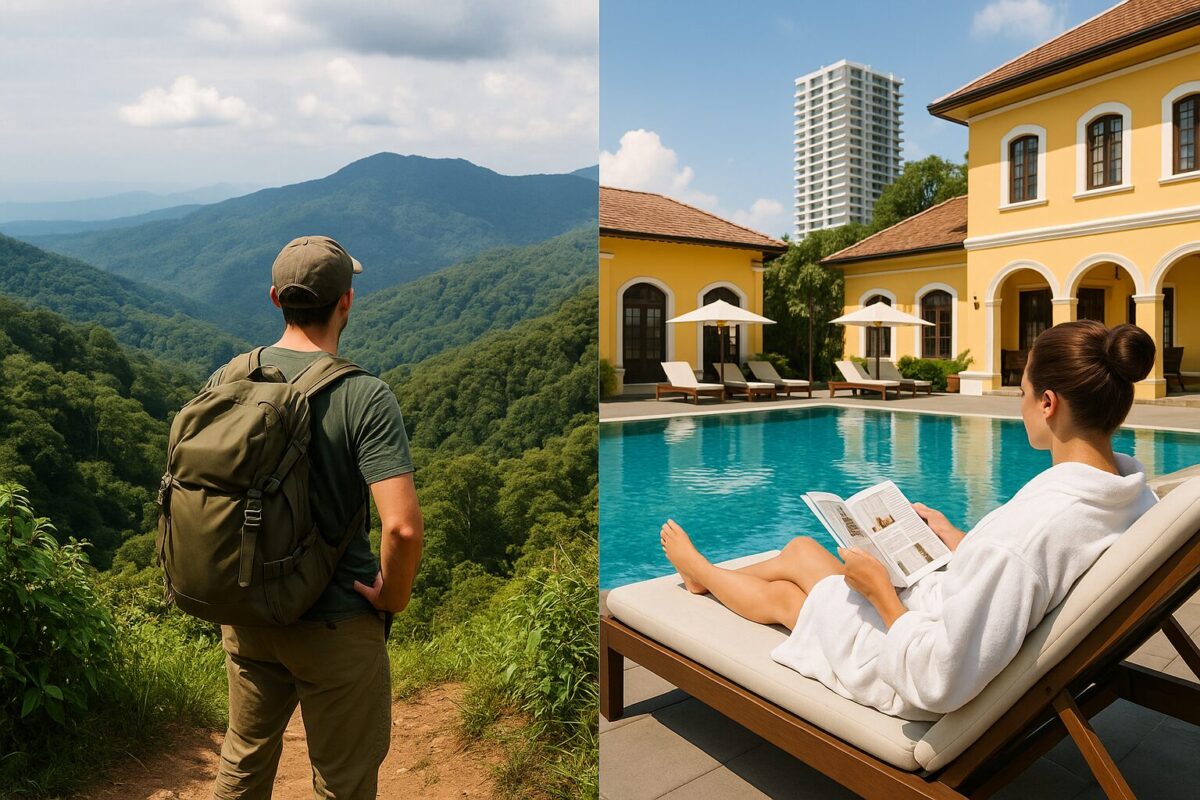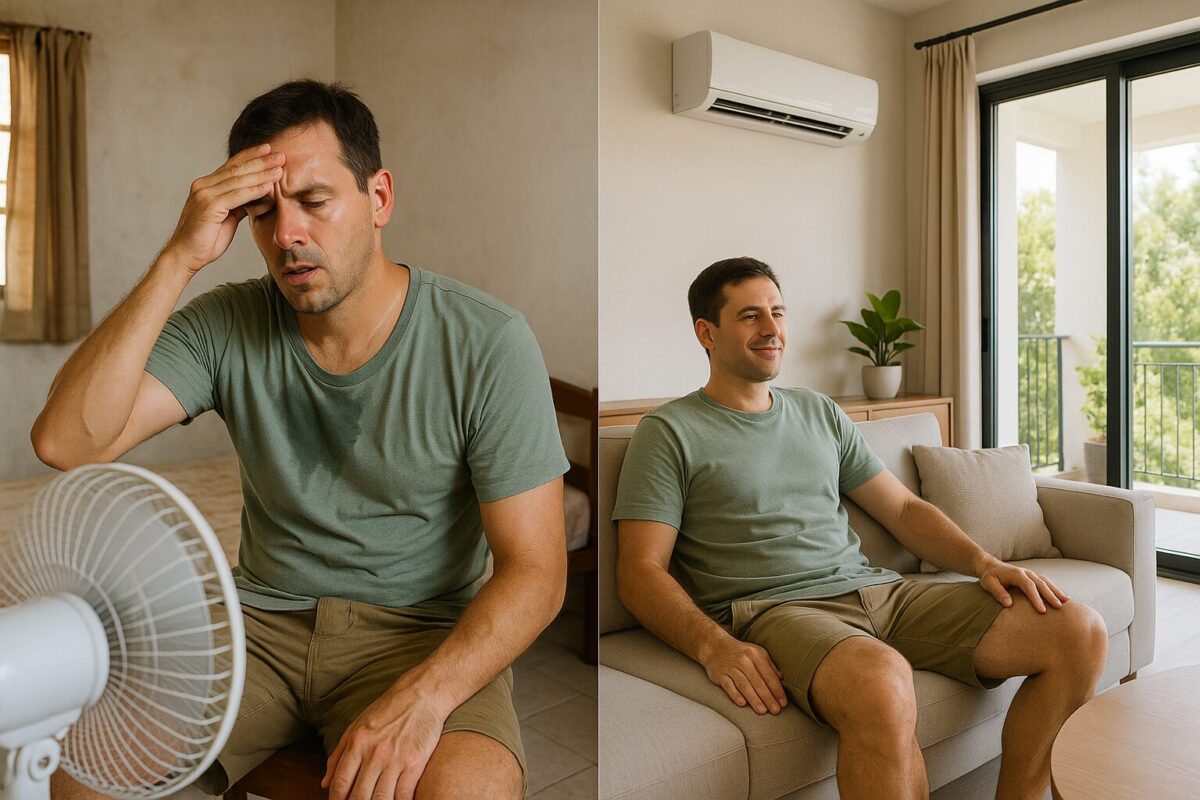Why live in Chiang Mai?
If you’ve ever sat in a grey office cubicle, scrolling through travel blogs and wondering if you could actually live or retire in Thailand, chances are Chiang Mai’s name has popped up. And for good reasons.
Tucked between misty mountains and dotted with golden temples, Chiang Mai offers one of the best quality-of-life-to-cost ratios in the world. Here, the rent for a modern one-bedroom with a pool might cost less than your car payment back home, dinner can be a $1.50 bowl of fragrant khao soi, and high-speed internet is faster than in some European capitals.
But how much does it really cost to live here in 2025?
The answer depends on your lifestyle. And that’s exactly what this guide will unpack. Drawing on insights from popular Thailand-based YouTubers like Paddy Doyle, Land of Smiles Thailand, and Retired Working For You, as well as up-to-date data from Numbeo, rental platforms, and local sources, we’ll break down housing, utilities, food, transport, healthcare, and more.
By the end, you’ll know exactly what kind of life your budget can buy in Chiang Mai, whether you’re here to stretch your savings, work remotely, or retire in comfort.
Housing & Rent Costs in Chiang Mai in 2025
If you picture Chiang Mai living as a bamboo hut in the mountains, you’re about a decade behind. These days, the city’s most sought-after rentals look more like boutique hotels — rooftop pools, gyms, cafés downstairs – and they still cost less than a single week’s rent in London or Sydney.
In Nimmanhaemin, the chic neighbourhood beloved by digital nomads, Paddy Doyle pays 12,000 baht ($335) for a sleek one-bedroom with a pool, gym, and 24-hour security.
“It’s walking distance to my favourite coffee shop, and still cheaper than my student flat back in the UK.” – Paddy Doyle
Move just 15 minutes outside the Old City and prices drop dramatically. Figure on 6,000-8,000 baht ($167-$224) for a simple but comfortable one-bedroom in areas like Hang Dong or Santitham.
Average Rent (Aug 2025):
| Location | Property Type | Monthly Rent (THB) | USD Equivalent |
|---|---|---|---|
| Nimmanhaemin | 1-bed modern condo (pool, gym) | 12,000-12,500 | $335-$348 |
| Old City | Studio / small 1-bed | 8,500-9,500 | $238-$266 |
| Hang Dong / Suburbs | Simple 1-bed apartment | 6,000-8,000 | $167-$224 |
Pro Tip: Negotiate for long stays. Six-month or one-year leases often get you 10 -15% off the monthly rate, especially in low season (May to October).
Utilities & Internet Costs for Chiang Mai 2025
One of the quiet joys of life in Chiang Mai is opening your utility bill and not feeling your blood pressure spike. Even in the hottest months, most expats spend less on electricity, water, and internet combined than a single week’s utilities in the West.
The wildcard is air conditioning.
“In the cool season my bill’s around 1,500 baht ($42), but as soon as the hot season hits and the aircon’s running all night, it jumps to 3,000 baht ($84). Still, that’s less than a takeaway pizza back home.” – Paddy Doyle
Water is almost laughably cheap at about 200 baht ($5.50) a month. High-speed fibre internet – 200 to 500 Mbps – costs roughly 550-600 baht ($15-$17). Couples or retirees using more aircon should expect combined utilities around 3,500 baht ($97) per month.
Average Monthly Utilities:
| Service | Cost (THB) | USD Equivalent | Notes |
|---|---|---|---|
| Electricity (cool season) | 1,500 | $42 | Minimal aircon use |
| Electricity (hot season) | 2,500-3,000 | $70-$84 | Heavy aircon use |
| Water | 200 | $5.50 | 1-2 people |
| High-speed fibre optic internet | 550-600 | $15-$17 | 200-500 Mbps |
| Combined total (avg) | 3,000-3,500 | $83-$97 | Includes all above |
Pro Tip: If you work from home, choose a building with north-facing windows or good cross-ventilation. It’ll cut your aircon bill dramatically and you’ll appreciate it during Burning Season.
Food Costs for Chiang Mai 2025
If Chiang Mai had a love language, it would be food and it would speak it fluently for less than the price of a Starbucks latte back home.
On the budget end, street food is king.
“You can eat for 50-70 baht ($1.40-$2) a meal. A bowl of khao soi, rice with stir-fried basil chicken, whatever you fancy. That’s less than a bag of crisps in the UK.” – Paddy Doyle
At the Chang Phuak Gate night market, you might grab pork skewers for 15 baht ($0.42) each, mango sticky rice for 70 baht ($1.94), and a fresh fruit smoothie for 40 baht ($1.10). More than enough to fill you up for under $4.
Western cafés and restaurants are easy to find, especially around Nimman. Expect to pay 150-200 baht ($4-$5.50) for breakfast, and 300+ baht ($8.30) for imported steaks or artisanal pizzas.
Monthly Food Budgets 2025:
| Lifestyle | Monthly Spend (THB) | USD Equivalent | Notes |
|---|---|---|---|
| Street food & markets only | 7,000-8,000 | $194-$222 | 2 or -3 meals out daily, no Western dining |
| Mix of street food & cafés | 10,000-12,000 | $278-$333 | Balanced local & Western meals |
| Mostly Western dining | 15,000+ | $417+ | Regular restaurant meals, imported goods |
Pro Tip: Chiang Mai’s Sunday Night Market is not just for souvenirs – it’s a budget buffet. Arrive hungry and 200 baht ($5.50) will buy you a progressive dinner: grilled satay, crispy spring rolls, coconut ice cream, and a takeaway khao soi for breakfast tomorrow.
Transportation Costs in Chiang Mai 2025
In Chiang Mai, your transport budget can be as lean or as indulgent as you want. Most expats quickly discover that the motorbike is king. It’s cheap, fast, and lets you zip between temples, markets, and cafés without waiting for a taxi.
“I rent a scooter for 2,500 baht a month ($70). A full tank costs me about 60 baht ($1.65) and lasts three or four days. That’s cheaper than my morning coffee back home.” – Paddy Doyle
If you’re here long-term, buying a motorbike outright (30,000-50,000 baht, or $830-$1,380) can save you money over time. For the truly frugal, public songthaews, the red shared pickup trucks, run fixed routes for 30 baht ($0.83).
Prefer not to drive? Grab is widely available. Short trips in the Old City cost 60-80 baht ($1.65-$2.20), while airport runs or rides to the suburbs are around 120-160 baht ($3.30-$4.45).
Average Transport Costs:
| Mode of Transport | Monthly Cost (THB) | USD Equivalent | Notes |
|---|---|---|---|
| Motorbike rental | 2,000-3,000 | $55-$83 | Automatic scooter |
| Motorbike fuel | 600-800 | $16-$22 | 1 or 2 fill-ups/week |
| Grab short trip | 60-80 | $1.65-$2.20 | Within city centre |
| Grab long trip | 120-160 | $3.33-$4.45 | Airport or outer suburbs |
| Songthaew ride | 30 | $0.83 | Fixed routes only |
Pro Tip: If you rent a bike, always check the brakes and tyres before signing. Many rental shops in the Old City cater to tourists and don’t maintain their fleets as well as the local-owned shops just outside the moat.
Healthcare & Insurance Chiang Mai 2025
One of the best-kept secrets about living in Chiang Mai? You can walk into a spotless private hospital, see a doctor the same day, and walk out with your prescription. All this for far less than the cost of parking at a hospital in the West.
Vlogger Land of Smiles Thailand pays 60,000 baht a year ($1,660) for an international health insurance plan that covers private hospitals in Chiang Mai and Bangkok. “It’s peace of mind,” he explains, “especially as we get older.”
But plenty of expats skip the big insurance policies and just pay as they go. Retired Working For You notes that a GP visit at a private hospital is usually 500-800 baht ($14-$22), and a dental cleaning is around 1,200 baht ($33).
Average Medical Costs:
| Service | Cost (THB) | USD Equivalent | Notes |
|---|---|---|---|
| GP consultation (private) | 500-800 | $14-$22 | Same-day appointments common |
| Specialist consultation | 800-1,200 | $22-$33 | Orthopaedics, dermatology, etc. |
| Dental cleaning | 1,000-1,500 | $28-$42 | Well-equipped clinics |
| Annual checkup package | 4,500-8,000 | $125-$222 | Includes blood tests & screening |
| Basic expat insurance | 48,000-65,000/year | $1,330-$1,800 | Covers private Thai hospitals |
| Premium international insurance | 80,000-120,000/year | $2,220-$3,330 | Worldwide coverage |
Pro Tip: Even if you go without full insurance, consider a basic accident or emergency plan. It’s inexpensive and can save you thousands if you ever need surgery or a medical evacuation.
Sample Monthly Budgets for Chiang Mai 2025
Everyone asks the same question before moving to Chiang Mai: “How much will I actually spend each month?”
The truth is, you can live here on the cost of a weekly grocery run back home or you can splurge on imported cheese and weekend getaways to the islands. Which is why you’ll find longterm expats covering the range of budgets across Thailand.
Here’s what three realistic lifestyles look like:
1️⃣ Bare-Bones Digital Nomad / Minimalist
Who it’s for: Budget-conscious nomads, students, or younger retirees who don’t mind living simply.
- Housing: 7,000 baht ($195) – Simple one-bed outside city centre.
- Utilities & Internet: 2,500 baht ($69) – Light aircon use, fibre internet.
- Food: 7,000 baht ($195) – Street food and market meals.
- Transport: 2,500 baht ($69) – Motorbike rental + fuel.
- Healthcare: 1,000 baht ($28) – Pay-as-you-go checkups spread over the year.
- Leisure/Misc: 2,000 baht ($55) – Occasional cafés, gym, or cinema.
Total: 22,000 baht/month ($611)
💬 “If you stick to street food and live just outside Nimman, you can easily keep costs under 25,000 baht a month.” – Paddy Doyle
2️⃣ Comfortable Expat Lifestyle
Who it’s for: Most single expats and couples who want modern comforts but still great value.
- Housing: 12,000 baht ($335) – Modern one-bed in Nimmanhaemin with pool and gym.
- Utilities & Internet: 3,200 baht ($89) – Regular aircon use.
- Food: 11,000 baht ($305) – Street food, cafés, and some Western restaurants.
- Transport: 2,800 baht ($78) – Motorbike + occasional Grab rides.
- Healthcare: 4,500 baht ($125) – Mid-level health insurance or annual check-up allowance.
- Leisure/Misc: 5,000 baht ($139) – Weekend trips, gym, live music nights.
Total: 38,500 baht/month ($1,070)
💬 “Living well in Chiang Mai, with cafés, restaurants, and a modern condo, is still possible for under $1,100 a month.” – Land of Smiles Thailand
3️⃣ Luxury Expat / Retiree
Who it’s for: Retirees or professionals who want a Western standard of living with room to splurge.
- Housing: 25,000 baht ($695) – Luxury condo or private house with pool.
- Utilities & Internet: 4,500 baht ($125) – Heavy aircon use, premium internet.
- Food: 20,000 baht ($555) – Fine dining, imported groceries, wine.
- Transport: 6,000 baht ($167) – Car ownership or daily Grab.
- Healthcare: 8,000 baht ($222) – Premium health insurance.
- Leisure/Misc: 10,000 baht ($278) – Travel, golf, spa days.
Total: 73,500 baht/month ($2,042)
Pro Tip: Whatever your budget, keep a 10-15% buffer for visa runs, unexpected travel, or medical costs. Life here is affordable, but surprises still happen.
Seasonal Cost Factors for Life in Chiang Mai
Chiang Mai’s prices don’t change dramatically across the year, but your experience will. The weather, festivals, and even air quality can shape your budget and daily life.
February-April: Burning Season
Locals joke that the mountains “disappear” for two months — and they’re not wrong. Farmers burn crop stubble across the north, sending the AQI soaring.
- Impact on Costs: Higher electricity bills (more aircon use), possible spend on air purifiers, and many expats budget for a “smoke escape” i.e. a month or two in the islands or abroad.
“If you have respiratory issues, budget for a couple of months away from Chiang Mai during burning season.” – Chris Parker, Retired Working For You
November-February: Cool Season / High Season
Chiang Mai at its best: crisp mornings, blue skies, and the Yi Peng lantern festival.
- Impact on Costs: Slight rise in short-term rentals, busier restaurants and attractions. Popular with new arrivals — rentals go fast.
April: Songkran Festival
Three days (often more) of joyous chaos and city-wide water fights for Thai New Year.
- Impact on Costs: Higher hotel prices in the city centre, Grab fare surges, some businesses close. The atmosphere, however, is priceless.
Visa Renewal Periods
Not weather-related, but worth budgeting for: extensions or runs can cost 1,900-5,000 baht ($53-$139) depending on the visa type. If you plan on using a visa agent expect top pay around 12 – 18,000 baht for annual renewal.
Pros & Cons of Living in Chiang Mai
👍 Pros
- Low Cost of Living: Comfortable life under $1,100/month.
- Strong Expat & Nomad Community: Meetups, coworking spaces, social events.
- Fantastic Food: From 50 baht noodles to fine dining.
- Affordable Healthcare: Private hospitals at a fraction of Western prices.
- Compact & Easy to Navigate: Less traffic stress than Bangkok.
👎 Cons
- Burning Season Air Quality: Can be a dealbreaker for some.
- Limited Nightlife: Quieter than Bangkok or Pattaya.
- Visa Complexity: Long-term stays require paperwork and planning.
- High-Season Crowds: Cafés and markets can get busy.
- Local Job Market: Limited options unless remote working or teaching.
Conclusion
Chiang Mai isn’t just a place where your money goes further. It’s also a city where life slows down just enough to enjoy it. Mornings might be spent sipping a 60-baht cappuccino in a leafy café, afternoons exploring hidden sois on your motorbike, evenings wandering the markets with friends.
And whether you’re living on a shoestring budget of $600 a month or indulging in a luxury lifestyle for $2,000, you’ll find that the city rewards you in ways that don’t fit neatly into a spreadsheet. The sense of community, the culture and the daily pleasures of a simpler pace of life.
Next step? Why not check out the cost of living guides for Pattaya, Phuket, Hua Hin, or Bangkok to see what expat life in these areas will cost you.






